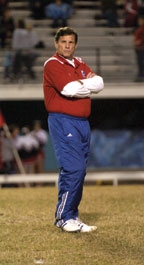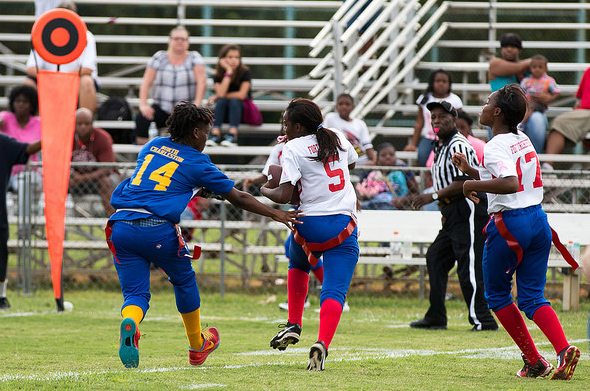Man on a Mission
J.T. Curtis, Jr. has maintained the academic/athletic excellence and tradition set forth by his late father, John Sr., at John Curtis Christian High School (River Ridge, LA) en route to becoming the second winningest H.S. football coach in the country.
Since succeeding his father as head coach in 1969, Curtis, who is entering his 39th season, has compiled an astounding 455-48-6 record, trailing only the legendary John McKissick of Summerville (SC) High.
 COACH: Your late father, John, founded John Curtis Christian School in 1962 – 46 years ago. Tell us about the impact your father had on not only you but the community in general? Talk about the early years and the multiple roles each family member has had in fostering and developing the family-run school.
COACH: Your late father, John, founded John Curtis Christian School in 1962 – 46 years ago. Tell us about the impact your father had on not only you but the community in general? Talk about the early years and the multiple roles each family member has had in fostering and developing the family-run school.
CURTIS: When my dad got into education, he was a missionary in Illinois in the middle 1950s. He was there to start Southern Baptist Churches for people who had relocated to that area of the country. He was approached by a gentleman, who turned out to be a principal of a local school, who was seeking a teacher for English and Spanish. My dad ended up taking the job and absolutely fell in love with the young people.
When he started in 1962, it was with a vision for a school that offered both academic and athletic excellence as well as moral and spiritual development for young people, but not necessarily affiliated with a church. So, we were a Christian school long before there ever was such a thing as a Christian school. His work ethic and dynamic personality, in terms of the can-do attitude with which he influenced young people, had a major impact on their lives.
My mother, Merle, was a certified teacher and she and my dad began the school together. My dad’s brother, Harry, also taught. And in 1963, my dad brought in his brother-in-law, Larry Manguno, my mother’s brother, who is still the school principal to this day. He began as the transportation director. Then I came in 1969, right out of college. My dad told me he was going to lose his football coach to a junior college in Mississippi and would I be interested in coming on. And I hadn’t quite graduated yet, I was nine hours short.
I showed up the first day with only six players and we wound up going 0-10. I had to ask myself, ‘What in the world am I doing?” When I enrolled at Louisiana College, I learned that I couldn’t take just nine hours, I had to take 30. So it was very trying time. But it was a time that we worked through and were able to overcome that. In 1970 we were able to get our first team into the playoffs and begin to have some success at that point.
COACH: What was your childhood like? What are your recollections growing up around football in Louisiana?
CURTIS: My dad just loved football. He played college ball at Louisiana College. Football and athletics were always a major part of our lives. My brother, Leon, who still works with me today, and my three sisters – Kathy, Debbie, and Alicia – who were all cheerleaders and who all participated in sports, all grew up around athletics. Athletics were very important to us.
COACH: Ironically, you never played high school football for your father, as he felt the John Curtis team was too young and inexperienced. Instead you attended East Jefferson High in nearby Metairie, where, under the tutelage of former Tulane University assistant coach Bob Whitman, you were a two-way tackle and the first player from East Jefferson to be named All-State. In 1965 you accepted a full scholarship to play for Frank Broyles at Arkansas before transferring to Louisiana College in Pineville, LA, for your senior year, and where you met your wife, Lydia. What kind of player were you? Was coaching always something you aspired to do?
CURTIS: I was like a lot of kids coming out of high school – I just knew I was going to the NFL. I was a really good player in high school and when I got into college I realized, ‘Guess what? You’re not quite as good as you thought you were.’ I needed to understand that I probably wasn’t going to the NFL and needed to settle myself down and get an education and a degree so I could make a living.
When I was eighth grade I knew that I wanted to be involved in athletics. And I assumed that coaching would be the next step because my dad coached. I really enjoyed the whole process of athletics. As time went on, it was clear that is what I wanted to do. I was very fortunate to be around such good people like my dad, Coach Whitman, and Coach Broyles, who had a major influence in terms of his organization. I think he was light years ahead of where other people were.
Of course, at the time I didn’t know that. When you’re a freshman and a sophomore in college you don’t realize that. But the guy was just an exceptional coach. Being around those kinds of people had a tremendous influence on my coaching philosophy that still exists today.
COACH: We understand that nine family members, including you, are coaches at the school in various sports. Your brother Leon is your top football assistant. Johnny Curtis is the head baseball coach while Jeff Curtis, Steve Curtis, and Matt Curtis (9th & JV) are the assistants. Dawn Curtis is the volleyball coach. Suffice to say, Coach Curtis is a popular phrase at the school. What is the Curtis coaching philosophy?
CURTIS: Leon came with me in 1971, right out of the Marine Corps, and has been with me ever since. He coaches the linebackers and is the defensive coordinator. Johnny Curtis, my oldest son, is the head baseball coach and coaches outside linebackers and special teams. Jeff Curtis, my youngest son, coaches quarterbacks and running backs. Steve Curtis, who is Leon’s youngest boy, works with outside linebackers and defensive line. Preston Curtis coaches the safeties. Matt Curtis coaches the wide receivers. My nephew, Lance Rickner, coaches the defensive line. My son-in-law, Tommy Fabacher, coaches the secondary and works with the cornerbacks. Dawn Curtis, who is Johnny’s wife, co-coaches volleyball.
Another fellow that you need to mention is Mike Robertson, my offensive line coach, who has been with me since 1975. He’s not a family member but he’s just like a family member. He graduated from high school here.
I think the family coaching philosophy started with my dad. The commitment to excellence and the determination and dedication of hard work we all learned from him and my mother. That has carried over into our lives – my life and my brother’s – and the lives of our sons. I think they have the same vision and commitment to the kids that they work with.
COACH: John Curtis won its 22nd state title this past season, and fourth in a row at the 2A level. We know there is no secret formula but surely you have done something right. How have you been able to maintain this commitment and level of excellence?
CURTIS: One of the most important things is consistency. I think everybody that works with us is on the same page. And they are committed to the program and what we are trying to do. What we do, that I think is really important, is that we continually try and improve ourselves. I think it’s important to recognize that the fundamentals never change. Sometimes the process of how we teach those fundamentals, or sometimes improving technique, can be learned. That is, I think, a key in our off-season program, in our weight program, and our running/speed development program, as well as our football program.
We are constantly trying to find a better way to accomplish what it is that we are trying to teach. And it doesn’t mean that we change, because we don’t just change. But we will make a change if we think it can be better for our kids, better for our process.
Don’t just change for change sake. That’s one of the mistakes I see a lot of people make in coaching. They give up too quickly on what they are doing if they are not immediately successful. It takes time to develop that consistent teaching pattern. That’s what wins for you over the long haul. Nothing we do is revolutionarily new. But we know this: We have an answer for what you’re going to try to do to us. We’ve been doing it long enough and consistently enough, that if you do this, we have answer for it. That’s what you need to be able to develop, both offensively and defensively.
COACH: Although your football program has garnered most of the acclaim, your other sports programs have also enjoyed tremendous success. The baseball and softballs teams, as of this interview, have won six and five state titles, respectively. The girls’ volleyball team is two-time state champs. The track squad has captured four state crowns entering this season, etc. Do you feel that the success of the football program has had a trickledown effect on the other sports, thereby raising the bar, so to speak?
CURTIS: I don’t think there is any question about that. I think that the success has bred success. And I think success breeds success. There is a high standard and our kids do want to achieve. Our girls won their first state basketball championship this season. If you could have been there you would have seen our football players in those stands, rooting and hollering and cheering those girls on. That is so important in the concept of team and school. It’s not about them, it’s about us. It’s about all of us being successful. That’s exactly what Mr. Curtis wanted when he started the school in 1962.
COACH: Tragedy struck your school last November when a 13-year-old student shot himself. As the Athletic Director/Headmaster, how did you handle the incident internally? We know that the school provided grief counselors and hosted a suicide prevention program. What advice can you provide to other athletic directors God forbid they should be confronted with a similar situation?
CURTIS: To say that that was one of the most difficult days or difficult weeks of our life would be an absolute understatement. Unless you experience something of that magnitude I don’t think you can ever fully comprehend it. The teachers and the kids did a great job when the word started circulating that this boy had shot himself.
After the police and the ambulance came we had an assembly. By that time, a number of news media had arrived at the campus, local and national. I spoke to the kids and told them what had happened and how important it was that they pray and keep the boy’s family in their prayers. I also spoke with them about the importance of supporting one another and coming to visit with grief counselors.
About the fourth day after the tragedy, by Thursday morning, our head counselor came to me, Dr. Randy Graff, who works at Tulane University— his wife teaches for us. Randy said to me, ‘I just wish there was something we could do. If we could just find something that the students could do together that would be great. I said, ‘Randy, our girls’ volleyball team is playing in the state playoffs today.’ But we didn’t know if we should invite the kids to go, because it was such a bad time. He said it was the best thing that they could do. And we did. We told the students that if they wanted to go to the game, we would provide transportation.
We wound up taking 400 kids. It was a healing process, because we won that game and went back and played on Friday in the semifinals. And even though we got beat, athletics served such a positive force in bringing them back together as a school. It was very cathartic. And it reunited us. We’re still a school. Even though we lost that volleyball game we still won. We were by far the winner.
I would tell people that all of the grief counseling and all of those things in terms of being sensitive to their needs is really important. But to have them rally together, athletics serves a great purpose.
COACH: Your team is the subject of the outstanding book, Hurricane Season: A Coach, His Team, and Their Triumph. Obviously, those of us that were unaffected by the devastation of Hurricane Katrina cannot come close to fully understanding and comprehending the impact and magnitude on those in the New Orleans-area. What was the idea behind the book, the lessons it teaches, and the profound impact the emotional period has left on you and the River Ridge, LA community?
CURTIS: I don’t think we will ever be the same. I don’t think you can comprehend the devastation and the sorrow of the loss of people and their possessions. You never realize how important your stuff is to you. When it’s gone it’s gone. The general public cannot understand the magnitude of the impact it had on our community.
We had damage to the school, but we felt that we could recover. We lost the roofs from two classrooms and we had water damage at the high school, but it was all stuff we could repair and we did. We were the first school to open up in our area. We opened on Sept. 24, which was about a month after the hurricane. So we were very fortunate from that standpoint. Our commitment at that point was to start school and get back to something positive. Our mindset was to do what we could do, not what we couldn’t do.
The football team missed five games. We came back and played a team in Florida, and then we started playing teams in our district. We had players trickle in a little at a time and by the 10th playing date, we got our last player back. There were a total of 15-18 kids who were unable to return. We felt at that point that we beginning to really gel as a football team. Of course, they were highly motivated. What was so interesting, and we talked about this in the book a little bit, was that the only normal thing in the lives of our kids and the lives of their parents – for the kids it was school and football and for the parents it was ball. Friday night was the only thing that they had in their life that was like it was prior to Katrina. It became a therapy session. It became a time for people to come together and just enjoy the game.
The first game we played in our district was against East St. John High School from Reserve, LA. I told their coach, Larry Dauterive, that I had no idea if we would have 10 people there or 50 or how many players I would have, but that we needed to come and play and get started. We lost that game, 16-7. And obviously we don’t lose very much. When we do it’s usually pretty tough. After that game it wasn’t even an issue. Football became a focal point in their life, a way of normalcy. That 2005 season became such a special year: Our drive through the playoffs and going to Shreveport to play the state championship. That’s how the book kind of got born.
COACH: With the advent of cable television have come the so-called “Made for TV” scholastic contests between national powerhouse football and basketball programs, be it regular season or championship games. Are these games good or bad for high school sports in general? What are the pros and cons? Tell us your opinion as both a football coach and an athletic director.
CURTIS: I think there are some positives. I really do. It’s great exposure for the kinds in terms of being able to compete against players and teams from other parts of the country. I think it’s a great and exciting challenge for them because it is still being done in a very pure, amateurish status: We are helped with expenses; we’re not going to make a lot of money but we’re not going to lose money; and the kids get a chance to play on national television. That’s good. I don’t think there is any exploitation at this point because the money hasn’t gotten into it. It’s still a pure form of competition. What I am concerned about is, if it does well, which it has, that money will enter into it. Then you start trying to influence people, whether it’s their program or their scheduling, from a financial standpoint. That’s a fine line. It worries me that it might become a problem. As a purist that bothers me a bit.
COACH: There was a report by Ken Trahan in his prep report for the WGSO (99 AM) Web site that stated innuendo of you having a big influence on where your players chose to attend college, even going so far as to freezing out the home-state Louisiana State program in favor of schools like USC and Alabama. Can you respond to those claims? Are they justified? How influential should a high school coach be in regards to the college decision making process?
CURTIS: I think Kenny did a nice job talking about that. There was a lot of upheaval in our state when Joe McKnight decided to go to USC. There was a big push to sign Joe and they were unable to do that. The fallout and furor was that I had a lot of influence in Joe going to USC and that I had not given LSU a fair chance. That was the furthest thing from the truth. My relationship with LSU, as it is with any college, is positive. I don’t have an influence on telling kids where to go nor would I ever do that. College football is a multi-billion dollar business. I try to help kids make decisions that are in their best interest by answering their questions as honestly and forthrightly as possible. If I can’t answer a question, I have no problem picking up the phone and calling Coach Miles at LSU, or Coach Weis at Notre Dame, or Coach Carroll at USC and saying, ‘This is a concern.’ The thing about recruiting that people forget – and I understand the passion of fans – is that I have kids on my team that are not recruited by LSU, USC, or Notre Dame that I think can play at those universities. There is nothing personal in that. It’s just a matter of personal preference. My job is to help my players make a good decision for the right reasons, not because the teams’ uniform is pretty or they have good looking cheerleaders. But because that university has all of the things they need to be effective as a student-athlete.
COACH: You are considered one of the most demanding coaches in high school football, with a relentless penchant for fundamentals and exacting detail. Obviously the results speak for themselves, but how do you know when you have gone too far, so as not to alienate your players?
CURTIS: The demands are this: I do not cut players. But there are a lot of requirements to be on the team. There’s a lot of off-season work that’s done. We run a great deal in the spring, for guys who are not involved in spring sports. We have a tough summer schedule to prepare us for the fall. It’s rigorous. And not everybody is willing to make those commitments. If there not, then I don’t have any problem with that. If they are, then I keep them on my team. What we try to do is to make sure our kids understand that everything we do is for them. It’s not to them. It’s to help them achieve. We don’t browbeat kids; I don’t run them into the ground. I teach them and I coach them. What I ask is that they just bring two things with them every day: A positive attitude and a good effort. If they’ll do those two things, with time, regardless of talent level, they will have a chance to be successful. That’s our emphasis point.
COACH: Some coaches are wary of disciplinary action fearing it may have an adverse effect. What is your approach? How can a coach use discipline to his or her advantage?
CURTIS: Student-athletes and kids in general want to be disciplined. They want to know what their boundaries are. The key is not to make a rule about everything. I’m not interested in controlling their lives. I’m not interested in knowing every little detail of who they are and what they are. They want to know that you care for them and that you will demand they do the right thing. And if they don’t do the right thing you’re going to make a correction. Even though they balk against that sometimes and even though they fuss and make faces and probably say bad things about me behind my back, that doesn’t bother me because I know deep down this is what they really want.
COACH: For all of your personal achievements and the school’s mythic standing among high school football titans, what is the one thing that you are most grateful for during your tenure?
CURTIS: Really and truly, it’s the opportunity to work with people and with kids and families that really want the same things that I want. They really are committed to the same things that I want. And they have the same values that I have. It’s been one of the reasons why I haven’t accepted a college coaching job or gone to pro ball. Because I know that doesn’t exist everywhere. And that’s very important to me. I have to tell you that it doesn’t seem like work to me. It’s enjoyment for me.
I do a lot of public speaking for businesses and executive groups and one of the things that I emphasize is creating an environment where everybody is working in the same direction for the same goal, and where everybody benefits from it. It’s a win-win process. That’s what we’ve been able to accomplish here.
About the Author
Kevin Newell is the former editor of Coach and Athletic Director magazine.





